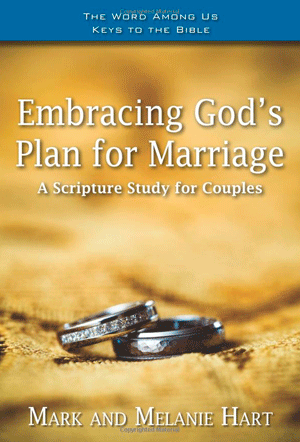Psychologists cite incompatibility as the number one cause for the rising divorce rates. Research, studies, and statistics prove it. Being “in love” is the least rational reason for marriage, according to the psychological scientific community.

Of course, whenever scientists reduce people or their relationships to mere statistics, trouble ensues. Remember, there is an abortion rate.
Mark and Melanie Hart’s new book, “Embracing God’s Plan for Marriage: A Scripture Study for Couples,” does not reduce anything except the pessimism of secular worldviews that ignore or deny God.
As with any good Catholic book, the main assumption is that God exists and that He has a plan for us.
The book explores scriptural references to marriage, contains commentary, questions for readers to answer, reflections, and actions readers can take. If this were a self-help book, it would be one on steroids; instead, it breaks open the Word to allow us access to the truth about marriage and how to live it to its fullest.
Unlike psychologists who often suggest real compatibility analysis before considering marriage — the presumption must be that a couple should be X percent compatible or they should look elsewhere — Mark and Melanie take the position that love is a call and that a couple’s job is to answer it and learn what it means to be sanctified by the sacrament of marriage. According to Church teaching, we grow in love (become one flesh) and are changed so that our compatibility is unified in Christ and the following of His Commandments.
Catholics need to believe that being called to marriage is not simply just a roll of the dice by God. He has a plan.
The study begins at Genesis — always a good place to begin — illustrating the divine design, “male and female He created them” (1:27).
In the commentary, they contrast the innocence of the relationship between Adam and Eve before the fall and what happened after. Both Adam and Eve had no need for covering because the world was without shame in its pure state.
After the fall, as we all know, our physical relationship to one another became covered in shame and the sexuality of the married state became skewed and lust entered into the world. The discussion is apropos for today’s culture with rising divorce rates, the try-before-you-buy, cohabitation and gay marriage — which is not really about equality, but about breaking down foundational institutions.
If we do not believe that there is an evil one disguised as an angel of light, now is a good time to review our beliefs.
God created marriage with a specific purpose, even if that purpose has not always been embraced in the past. Genesis, as the couple explains, gives us that purpose: “Be fruitful and multiply” (1:28). Marriage is oriented toward procreation and the fulfillment of the spouses as a sign of the Church (Catechism, #1601), not only in the biblical sense, but in the natural sense as well.
Armed with this knowledge of the divine design, we can begin to learn how God manifests Himself as the center of our lives and especially in the marital state.
The second chapter, “It Takes Three to be Married,” reminds me of the fabulous and poignant poem by Robert Bly, “The Third Body,” which reads in part:
“The man sees the way his fingers move,
he sees her hands close around a book she hands to him
They obey a third body they have in common.
They have made a promise to love that body…”
Couples grow in Christ, His body, their common vessel.
The study proceeds through the progress of marriage after we recognize its purpose. We learn how to release our false selves, how to die to ourselves, the home as the domestic Church, and an invitation to intimacy replete with questions that readers answer, commentary, reflection, and actions that will help us bolster and nourish this marvelous sacrament.
Mark and Melanie have given us a gift, burgeoning with the Holy Spirit, stuffed with wisdom, and laced with a pattern of practicality from which every married person could benefit. This is a surprisingly good read for something so practical.
– – –
Robert Curtis, a life-professed Lay Dominican, is the author of 17 books, holds a master’s in creative writing, teaches composition at the University of Phoenix and creative writing at Rio Salado College.






